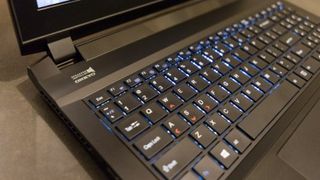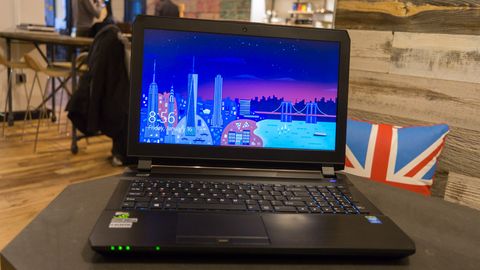Why you can trust TechRadar
Digital Storm's Triton is a slim little package measuring 0.98-inches thin. That said, the laptop weighs in at a substantial 5.5 pounds while its other dimensions are 15.16 inches wide and 10.67 inches deep.
The Origin EVO15-S and MSI GS60 Ghost Pro 3K are virtual twins sporting nearly the same body. MSI's just barely edges out as the slightly larger gaming laptop measuring in at 16.5 x 11.3 x 0.85 inches and 4.36 pounds. Meanwhile, the Origin EVO 15-S has dimensions of 15.35 x 10.47 x 0.78 inches and weighs 4.3 pounds.

Here is the Digital Storm Triton configuration given to TechRadar:
Spec Sheet
- CPU: 2.5GHz Intel Core i7-4710HQ (quad-core, 6MB cache, up to 3.5GHz with Turbo Boost)
- Graphics: Nvidia GeForce GTX 970M (3GB GDDR5 RAM), Intel HD Graphics 4600
- RAM: 8GB DDR3L (1600MHz)
- Screen: 15.6-inch, 1920 x 1080 (Anti-Glare) LED-backlit Matte Display
- Storage: 120GB SSD; 750GB HDD (7,200rpm)
- Ports: 3 x USB 3.0, 2.0 x mini Display Port, HDMI, Headphone jack, Microphone jack, Optical audio out, Ethernet, SD Card Reader, USIM card reader
- Connectivity: Intel Wireless-AC 7265 + Bluetooth 4.0
- Camera: 2MP 720p webcam
- Weight: 5.5 pounds
- Size: 15.16 x 10.67 x 0.98 inches (W x D x H)
The Triton is a pretty sweet deal for $1,620 (about £1,063, AU$1,974) considering it comes standard with a high-end Intel Core i7 4710HQ and Nvidia's proven GeForce GTX 970M mobile GPU. The only upgrade this particular unit has over the stock Triton, which retails for $1,512 (about £996, AU$1,835) is a 120GB SSD.
If you have a little more money in the bank, the next model up on the Triton tree includes a Nvidia GTX 980M graphics upgrade at a none-too-steep $1,889 (about £1,246, AU$2,309). What's more, Digital Storm machines at every tier include a three-year warranty with one-year part replacement and life-time technical support.

The stock EVO15-S runs with a very comparable chipset sharing the same processor and GPU - albeit with double the video RAM - for a much heftier $2,299 (about £1,516, AU$2,810). Origin's machine might seem absurdly more expensive, but keep in mind the price also includes 256GB of SSD storage, 250GB more in hard drive space, as well as double the amount of RAM.
On the other hand, the MSI GS60 is a somewhat affordable way of getting into 3K gaming for $1,899 (about £1,252, AU$2,321) on Amazon. The highest end Ghost Pro 3K variant offers up the same processor with last generation - but still very capable - Nvidia GTX 870M GPU with 16GB of RAM and, of course, the 2,880 x 1,620 IPS screen.
Performance
The Triton is a juggernaut when it comes to regular everyday computing task. It hardly broke a sweat swapping though a dozen tabs in Firefox, while simultaneously streaming Google Music and a Netflix movie as I typed up this review in Microsoft Word.
Although the laptop is rocking a Nvidia 970M with only 3GB of video RAM, it performed admirably at playing games. I was able to run both Middle Earth: Shadow of Mordor and Dragon Age Inquisition at a fairly consistent 45 frames per second (fps) and 30 fps, respectively
Sure it's not the silky smooth 60 fps that gamers crave, but these are playable frame rates and it was surprising to see the Triton keep up with the Origin EVO15-S, which came running with a beefier version of Nvidia's 970M packing 6GB of video RAM.
Benchmarks
- 3DMark: Ice Storm: 59,682; Cloud Gate: 18,787; Fire Strike: 5,649
- Cinebench CPU: 657 points; Graphics: 100.93 fps,
- PCMark 8 (Home Test): 3,012 points
- PCMark 8 Battery Life: 3 hours and 38 minutes
- Bioshock Infinite (1080p, Ultra): 103.04 fps; (1080p, Low): 148.71 fps
- Metro: Last Light (1080p, Ultra): 27.33 fps; (1080p, Low): 80.33 fps
In our benchmark tests the Digital Storm Triton put up quite a performance, once again staying on pace with the EVO15-S. The 3DMark graphics benchmarks test show the two laptops are posting nearly identical scores. This is especially apparent with Cloud Gate test, in which the Digital Storm laptop scored 18,787 points over the EVO15-S's 18,777 points. The Triton even topped the Origin machine's 5,559 point Fire Strike score by racking up 5,649 points.
By comparison the MSI GS60's Nvidia GeForce GTX 870M GPU is starting to slip by current standards. In the same tests the 3K gaming laptop put up some comparatively lower marks with 16,865 points in Cloud Gate and a Fire Strike score of 4,334 points.

Whip out your spare monitor and speaker
After being thoroughly impressed with the Triton's slim, metal build and stellar computing performance, it's sad to say that both the laptop's screen and speakers are disappointing.
The display is a low contrast TN panel that makes it hard to distinguish details in shadow. It also has extremely poor viewing angles. Even looking at the display by just a few degrees off center can wash out most of the on-screen detail.
Similarly, the speaker bar is surprisingly tinny despite the sizable drivers behind it. Considering this is also a branded speaker from Okyno, a Japanese electronics company specializing in home cinema and audio equipment, I was also expecting a more full-bodied sound from the laptop's tweeters.
Unfortunately subpar media experience is a sour note that essentially sullies everything great about the Triton. Sure it can play games well, but it won't look or sound great unless you invest in a decent monitor and pair of headphones to get a truly enjoyable multimedia experience.
Power sipping components
The Triton dodges the gaming laptop trope of poor battery life. Surprisingly, it lasted for three hours and 38 minutes on our PCMark 8 battery test. By comparison, the Origin EVO15-S quickly ran out of charge after a short 2 hours and two minutes while the MSI GS60 Ghost Pro 3K languished soon after 2 hours and 58 minutes.
With regular use the Triton saw me through a slightly shorter three hours and 10 minutes while browsing the web with a half dozen Firefox tabs open, streaming Google Play music and watching a short snippet of Jack Reacher on Netflix. All-in-all that's not too shabby for a high-powered and efficient gaming laptop.
Kevin Lee was a former computing reporter at TechRadar. Kevin is now the SEO Updates Editor at IGN based in New York. He handles all of the best of tech buying guides while also dipping his hand in the entertainment and games evergreen content. Kevin has over eight years of experience in the tech and games publications with previous bylines at Polygon, PC World, and more. Outside of work, Kevin is major movie buff of cult and bad films. He also regularly plays flight & space sim and racing games. IRL he's a fan of archery, axe throwing, and board games.


